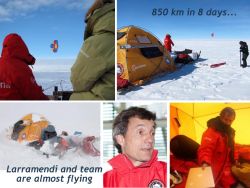Larramendi : Kiting 20 hours a day !
Published on 25.12.2011 - Acciona Windpower Antarctica 90°S
That worst storm ever encountered (on 19 December) by Larramendi did not cause any damage to the people and material. Spanish team is flying over the ice. With 850 km already covered since their start on 15 December.
If we remove the 19 December (day during which they were forced to stop their kite-sailing), the calculations give an average of 106 km per day -bumpy terrain, crevasses, soft snows and sastrugis included ! Not a bad result.
Spanish explorer Ramón Larramendi has always alleged (since his previous Antarctic Expedition in 2005-06 -'The Great antarctic Crossing' see our coverage in our old antarctica.org website), that his sled and sails could well change drastically (if not revolutionize) the way the people (researchers, scientists and technicians) working in Antarctica are travelling from one place to antother -from one base to another.
With this new expedition, Larramendi and team could well take a step forward. In less than fifteen days, he has proved that his coupling sled-tent (attached behind) could not only reach a 100 km pace per day (even more) but also resist to winds of over 130 km/h. A promising achievement.
This time, the expedition is also conducting scientific projects. On 20 December, Juan Pablo Albar (a biochemistery scientist, specializing in Proteome and head of Spains National Proteome Institute) writes about these programmes : "... As a researcher, my role on this expedition is to coordinate three scientific projects that we’ll be carrying out at various stages of our 3,500km crossing.
- The first project concerns levels of isotope (oxygen and hydrogen) concentration in snow and whose variables are related to climate change. To do so, we’ll be taking samples every 50km. The principal researcher is Dr. Jean Robert Petit of the Grenoble Institute of Glaciology (France).
- The principal researcher of the second project (one which I personally find extremely attractive) is Jordi Dach of the IDAEA and the Department of the Environment institute of the CSIC. Jordi’s team, also coordinated by Ana Cabrerizo, has developed a device for taking samples of the air; it enables us to take new readings of the existence of persistent organic pollutants, also known as POPs. The samples are captured every five days through the device’s absorbent membranes. These two projects are both related to climate change. Thanks to our entirely zero-emissions vehicle, we’ll be able to take regular readings without introducing any contaminating factors. That makes it the ideal vehicle for this kind of experiment.
- The third project, led by Dr. Antonio Quesada and co-directed by David Velázquez of the Department of Biology of Madrid’s Universidad Autónoma, will be taking samples of surface ice to see if it contains remains of life forms. Snow-ice samples of up to one kilo or one-and-a-half in weight will be taken every 750km. But we’re not altogether certain that we’ll find remains of life forms.
These, then, are the three scientific projects that we’ll be attempting to implement in the sampling phase; the analysis phase will be conducted in the different labs of origin located in Grenoble, Barcelona y Madrid."











